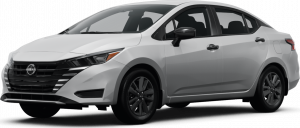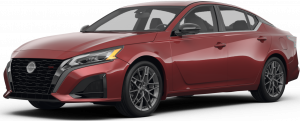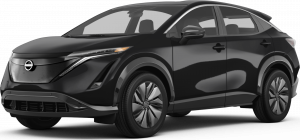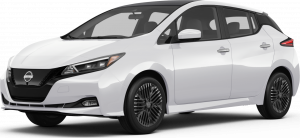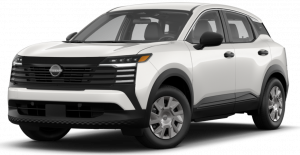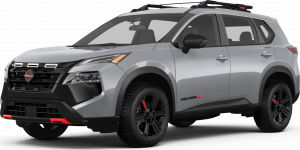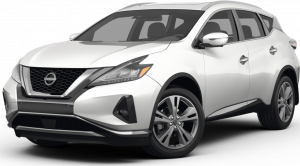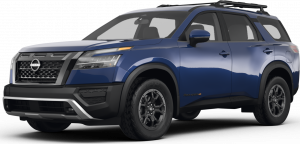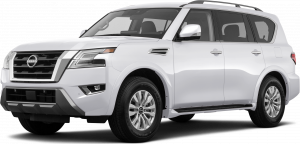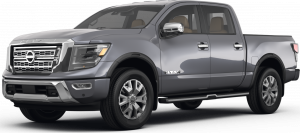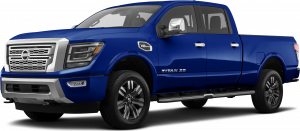Are Car Down Payments Illegal?
While there are some myths circulating that claim otherwise, car down payments are perfectly legal. Popular social media platforms have spread misinformation, often causing car buyers confusion at auto dealerships. In fact, down payments are an effective way to reduce your loan amount – and your credit burden!
For example, let’s assume you plan to finance a new Nissan truck that costs $41,000. By putting $5,000 down, you only need a loan for the remaining $36,000, as opposed to the initial $41,000.
When buying a car, keep in mind that you’re not just paying the principal and interest. There are also taxes, fees, and warranties to consider as well – which easily can add up to $5,000!

How Can I Get a Car with No Down Payment? Zero Down?
If you decide to pursue a zero-down loan, we recommend the following to qualify for 100% financing:
Tip #1: Get a Co-Signer
Getting a family member or a friend with a strong credit score to cosign your loan can be very beneficial, especially if your credit is less than ideal. A co-signer agrees to take responsibility for your debt and payment if you default on payments. This will negatively impact your credit score as well as your co-signer’s credit score. Be sure to keep record of all transactions about the loan, and to choose a co-signer that you trust.
Note: Not all lenders accommodate co-signers, so make sure to do your research and check out multiple lenders before applying.
Tip #2: Negotiate a Higher Monthly Payment.
The size of your monthly payments reflects your down payment amount. The more money you initially put down, the lower your monthly payments. That’s why most buyers try to put down as much as they can upfront. Down payments also eliminate lender risk, making you more appealing as a borrower – and allowing for lower interest rates and monthly payments.
You can, however, negotiate a higher monthly payment with lenders to avoid a down payment. Note that higher monthly payments typically accompany higher interest rates, meaning that you will pay more over time.
For example, let’s say you have a $25,000 loan for a car with a 5% interest rate over 72 months. With a 20% down payment of $5,000, you’ll pay $322 monthly and $3,191 in overall interest. However, with no down payment, you’ll pay $403 monthly and $3,988 in overall interest.
Tip #3: Increase Your Credit Score.
Your credit score plays a major role in assessing your eligibility for a no down payment car loan. Most lenders require a FICO credit score of at least 680 in order to qualify.
If your credit score falls below 680, improve it before applying for a loan. We recommend reviewing your credit reports, monitoring your score, and always making monthly bill payments on time. You should also strive to maintain a credit utilization ratio – credit card balances compared to total available credit – below 30%.
Tip #4: Compare Offers.
Car loan offers can vary from one lender to the next, and are also influenced by location, market prices, and other factors. So, make sure to shop around when selecting a loan! Consider banks, dealership financing, credit unions, and online lenders that offer specialized loans with no down payment options.
Tip #5: Choose a Cheaper Car.
Choosing a vehicle that fits your budget is key to securing a loan. If you aren’t getting approved, one option is to pick a more affordable vehicle. If you still cannot get a loan, consider asking your loan specialist how much you would need to save for a down payment.
How to Save Money for a Car Down Payment
Tip #1: Implement the 50/30/20 Rule or 60/20/10 Rule.
Keep track of your income and expenses, then develop a savings strategy to bring your financial goals into focus. The 50/30/20 budget rule is a popular budgeting method that divides your income into three recommended categories: 50% for needs, 30% for wants, and 20% for savings.
Modern economists have also offered an alternative called the 60/20/10 rule. This method allocates 60% to living expenses, 20% toward achieving financial goals, 10% to savings, and 10% on wants to be spent as desired.
Tip #2: Open a Savings Account.
Having a separate savings account can help keep track of your savings and monitor progress. A high-yield savings account is often a wise option, allowing you to grow your money with interest over time.
Tip #3: Add Another Stream of Income.
If your primary source of income goes toward paying off bills and other expenses, an additional income stream to your savings makes it easier to save each month. This income may come from a part-time job, freelance work, or the sale of products or services online.
Tip #4: Trim Wasteful Expenses.
It’s a smart financial move to cut non-essentials from your expenses, like gym memberships, shopping, or vacations. Remember that this doesn’t have to be permanent! Sacrifices now will pay off big in the future.
Tip #5: Determine Whether It’s Best to Buy a New or Used Car.
Decide whether you’re going to buy a brand-new vehicle or a pre-owned car. Keep in mind that most car dealerships require you to put at least a few thousand dollars down when buying a vehicle fresh from the factory. If you’re still set on buying new, calculate how much you can afford to spend on monthly payments. Used cars are typically more budget-friendly, offering great value for your money without breaking the bank.
Tip #6: Consider Leading Instead of Buying.
Leasing is a great option, especially if you want a brand-new or almost-new car. Leases require a down payment and monthly payments just like new cars, but you’re only obligated to keep them for the length of the lease term – often two or three years.
However, leases have restrictions that buying doesn’t – like mileage limits, penalties for “wear and tear,” and more.
Tip #7: Trade In to Save Money.
If you own a vehicle already, trading it in puts money in your pocket that can then be used toward a new vehicle. Some dealerships offer trade-in deals where they’ll buy your car and apply the purchase price toward the down payment on a new or used car.
To determine your current vehicle’s value, use an easy-to-use calculator to assess value based on year, make, model, and condition.
Tip #8: Use a Credit Card.
Some dealerships accept credit cards or a down payment. While accumulating credit card debt to pay for a down payment isn’t ideal, it could make sense in certain circumstances. For example, it may be the only way to secure loan approval for a car that’s needed to get to work.
You will be charged an additional fee for paying with a credit card, so take that into account as well. Be sure to pay off the balance as quickly as you can to avoid paying high interest over an extended period of time.
Planning is Complete. Now Let’s Buy a Car!
Now that you’ve saved up, it’s time to find your new ride! Here at Nissan of Orangeburg, we’ve made financing as simple and stress-free as possible.
Our financing experts are here to help, proudly serving drivers from Columbia to Charleston – and everywhere in between!
Once you’ve secured a loan or lease, make sure to follow through on payments. Paying on time each month must become a priority to avoid damage to your credit, and if you’re unable to pay, notify your lender immediately. They may be able to work with you, but if you don’t communicate, your financial future will surely suffer.
If you’re ready to start your search for the perfect new Nissan, our team is standing by. Get started by visiting today!
FAQS
What is the lowest credit score for a car?
Most lenders require a minimum credit score of at least 675 for used car buyers. Most buyers who secure a loan for a new vehicle have higher scores of around 730, ensuring they gain access to lower monthly payments and interest rates.
Can I get a car with a 500-credit score with no money down?
A credit score of 500 is considered “poor,” making it difficult to get a loan. Higher risk borrowers also have higher interest rates and may be required to put more money down.
What are acceptable forms of down payment for a car?
The most common form of down payment is cash or its equivalent. Most dealerships accept personal checks, money orders, and credit cards. Trading in your current car can also be used as a form of down payment.
What can a car buyer with a bad credit score do to get a car?
If you have bad credit, we suggest taking these steps:
- Check your credit report: Before applying for a car loan, check your credit report for any errors that may be impacting your score. If you spot anything suspicious, get the error corrected before applying for a loan.
- Improve your credit score: If you have time before applying for an auto loan, boost your credit score by paying off any outstanding debts and making timely payments on other loans.
- Get pre-approved: Before shopping for a car, get pre-approved by a reputable lender that specializes in bad credit loans.
- Consider a co-signer: If your credit score is too low to qualify for a loan on your own, consider asking a co-signer with good credit for help.
- Make a larger down payment: If it fits your budget, make a larger down payment to reduce your monthly payments and make you a more attractive borrower.
- Be prepared to pay a higher interest rate: Bad credit auto loans typically come with higher interest rates, so be prepared to pay more in interest over time.
If I have no credit, can I still buy a car?
Yes, you can purchase a vehicle even if you have no credit score. One way to purchase a car with no FICO score is to avoid financing the purchase and pay for it upfront. This isn’t typically an option for most buyers. Because lenders prefer buyers with a trustworthy payment history, your options may be limited if you have no credit. It may help, however, to bring evidence of a consistent income.
Will using a cosigner improve my auto loan?
A cosigner is someone who takes some responsibility for your loan, so adding one to your loan can help improve the terms. Consider asking those with higher credit scores to help reduce your lending risk – and hopefully lower your rate!
Will all of my car down payment go to principal?
Your down payment reduces the total amount financed – the cost of the vehicle plus any added features, fees, and taxes, minus the down payment.
For example, if your balance on a new Nissan SUV is $31,000 overall, a $4,000 down payment reduces the amount financed to $27,000.

